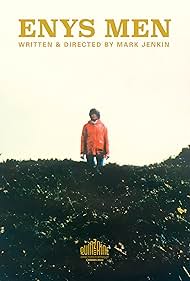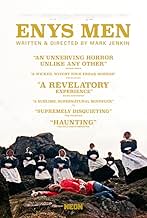Set in the spring of 1973, "Enys Men" follows a wildlife researcher documenting the growth of flowers on an isolated island off the coast of Cornwall, whose daily repetitive rituals slowly morph into a psychological (and possibly supernatural) nightmare.
There's really no way around it--this is certainly not a film where much "happens", and it is bound to frustrate viewers expecting a substantial payoff. You will not get it. However, there's also no way around arguing that "Enys Men" is utterly gorgeous from beginning to end. Shot on aged film stock, it is littered with scratches, lens flares, and enough textural grit to appease any self-respecting grindhouse aficionado. The island setting, riddled with stone ruins of an old settlement, is haunting and beautiful. Stylistically, it all comes together as a visual and thematic mashup of films such as "The Shining", Robert Altman's "Images", "Jeanne Dielman, 23 quai du Commerce, 1080 Bruxelles", and even "The Texas Chain Saw Massacre".
While some reviewers have asserted that the filmmakers have approached the material in a literary manner, the real narrative locus here is wholly visual, and the director presents a repetitious scattershot of images that make suggestions but demand the audience imagine the connective tissue themselves. There is less than a paragraph of dialogue throughout it, and the subtle visual nods to the island's historical background emerge perhaps more strongly than the character herself, rendering the film an immersive interpretive exercise for the audience that is engrossing but certainly not thrilling.
"Enys Men" unfurls itself slowly, beginning as a quiet meditation on a researcher's lonesome study of nature, before slowly descending into a nightmare world where the natural landscape, figments of the researcher's imagination and/or individuals from her past (including a young woman who obliquely appears alongside her, possibly a younger version of herself), and spectral figures connected to the island's history (miners, doomed mariners, and a priest) all collide into a perverse tapestry. Even milkmaids on a tin canister of dried milk in the kitchen come to life here.
While there is perhaps no tangible throughline in terms of narrative, I think the film succeeds as a twisted portrait of human isolation. As the researcher's rations and resources dwindle, nature and history begin to take over. Lichens grow on both the flowers she studies as well as on her body itself--the island's landscape, its ancient stone monolith, and the ghosts of its past, tighten their grip both mentally and physically. There's little relief and even less explanation, but an unshakeable ominous tone pervades from start to finish. It is certainly not a film that aims to traditionally entertain, but it is one to get lost in--or consumed by. 8/10.










